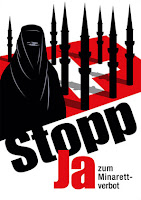Posts
Showing posts with the label face veil
Britain's niqab debate - Channel 4 by Spyros A. Sofos
- Get link
- X
- Other Apps

The debate about the face veil is not a novel one. Muslim notions of modesty, have often been subverted and colonized by patriarchal practices seeking to restrict women's autonomy. As such, the veil issue has mobilized social forces inspired by liberalism and Western feminism and generated valuable criticisms of patriarchy in Muslim communities. On the other hand, Muslim women in Europe (but also in parts of the Middle East, North Africa and Asia where secularist forces have been able to inform or determine state policy) who choose or are forced to cover their bodies and faces are often subjected to state regulation and disciplining. Focusing on Europe, it is undeniable that the 'out of place' look of veiled women in public spaces all over the continent has provided fertile ground for the transformation of the veil issue into a potent mobilizing symbol for xenophobic, right-wing forces only too happy to jump into the bandwagon of the secular, liberal and feminist oppositio...
- Get link
- X
- Other Apps

"ISLAM AND NATIONALISM". A new book series from Palgrave Macmillan. Series editors Umut Özkırımlı and Spyros A. Sofos - Center for Middle Eastern Studies, Lund University. International Advisory Board includes (in alphabetical order) Seyla Benhabib, Sondra Hale, Deniz Kandiyoti, Saba Mahmood, Jorgen S. Nielsen, James Piscatori, Gayatri C. Spivak, Bryan S. Turner, Peter van der Veer, Nira Yuval-Davis and Sami Zubaida. One of the main objectives of this series is to explore the relationship between Islam, nationalism and citizenship in its diverse expressions. The series intends to provide a space for approaches that recognize the potential of Islam to permeate and inspire national forms of identification, and systems of government as well as its capacity to inspire oppositional politics, alternative modes of belonging and the formation of counterpublics in a variety of local, national or transnational contexts. By recognizing Islam as a transnational phenomenon and situati...
one vote against ....
- Get link
- X
- Other Apps

The French Senate voted almost unanimously to ban face-covering Islamic veils in public, opening the way for the enactment of the colloquially called anti-burqa law. Interestingly, 246 senators overwhelmingly outnumbered the one and only opponent of the law who voted against it. Similarly, in July, the bill sailed through the Assemblée nationale by a vote of 335 to 1. Despite the intense public debate, within the serene confines of France's legislature the law united government and opposition and was met with virtually no resistance. It is telling that not only the rights of the estimated 2,000 French Muslim women who wear variants of the full cover, but also the broader right of self determination of hundreds of thousands of French Muslim women which the bill symbolically challenges have not been deemed worth defending by the French legislators.
constitutional vandalism: the video
- Get link
- X
- Other Apps

The French Conseil d'Etat considered back in May that a total ban of the face veil in France would present serious constitutional risks and could not rest on any sound juridical foundation. Burqa : le Conseil d'Etat écarte l'interdiction - kewego Une interdiction totale du port du voile intégral en France présenterait de sérieux risques constitutionnels et ne pourrait trouver aucun fondement juridique incontestable, estime le Conseil d'Etat. Keywords: voile intégral nijab burqa musulman conseil etat loi interdiction Video from bfmtv
Face Veils revisited
- Get link
- X
- Other Apps

In my post of 26 June, I expressed my doubts as to the stated rationale behind Barcelona’s ban of the face veil from civic buildings. Despite the feeble attempts of Barcelona’s mayor, Jordi Hereu, to decouple the burqa ban from popular and official unease and prejudice towards Islam, the statements of Spanish Justice Minister Francisco Caamano reveal the complexity of the issue: the Spanish Government is prepared to repeat the onslaught against Muslim women at national level on the grounds of safety and security and of its concern about the dignity of Muslim women. Poster from the Swiss minaret referendum where the face veil is recruited to add to the moral panic about the Islamization of the country "We have to defend women's dignity and the burqa and similar garments - regardless of the religion they are from - that do not permit identification of the wearer, affect the dignity of that person, and in this case women," Caamano told reporters. Spokespersons of the cons...
To ban or not to ban? Some thoughts on Barcelona's decision to deny access to public buildings to women covering their face.
- Get link
- X
- Other Apps

The whole affair started by a short, dry statement from the Barcelona municipal government issued on the 14 th of June which announced in no uncertain terms that the city of Barcelona was going “to forbid the use of the burqa, niqab and any other item which hinders personal identification in any of the city's public installations” (these include civic centres, libraries, markets and nurseries, to name but a few). We then learned that the city administration had gone to great lengths to ensure that all sensitivities were taken into account as the city's commission on immigration policy had discussed a legal opinion, as to the extent and the legality of such a ban. According to news reports revealing the extent and ambition of the vision behind the ban, Barcelona’s mayor and member of the Partit dels Socialistes del Catalunya (PSC), presiding over a coalition municipal administration with the Iniciativa per Catalunya Verds , (ICV), a Green Left party as it defines itself, “r...